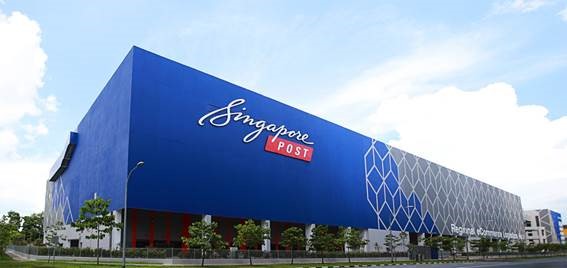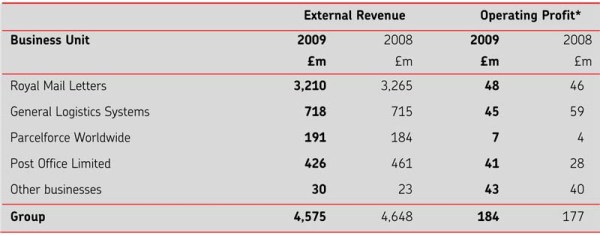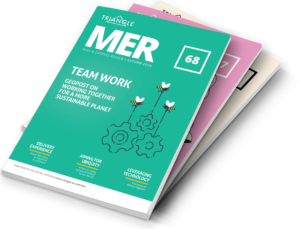
Royal Mail Group publish “resilient” results
Royal Mail Group made a £184m operating profit in the first half of 2009/10 – up 4% on the £177m profit in the same period last year. The improved profit is despite a drop in overall Group revenues due to the continuing decline in mail volumes and economic recession which, along with intensifying competition, had an impact on all of the Group’s businesses.
“The Group’s resilient financial performance, along with some of the best spring quality of service figures on record, shows that modernisation of the Letters business is working, while the further progress made on tackling costs across the Group has also helped sustain operating profit”, said chief executive Adam Crozier.
A company statement said:
- All four Group businesses – Royal Mail Letters, the Post Office, Parcelforce Worldwide and the European parcels business, GLS – remained in profit despite economic recession and intensifying competition in all our markets.
- Group operating profit increased by £7m in the six month period despite a £73m fall in revenues.
- Profits were underpinned by strong progress in our modernisation plan – now around two thirds of the way through with more than £1.3bn invested to date of the £2bn we are investing by 2011.
- The fall in revenue was caused by continuing decline in traditional mail volumes in the UK and around the world with UK volumes down by around 8% during the half year due to the effects of recession and the growth in electronic communications. The reduction in revenue was despite a positive contribution from packets and parcels driven by online shopping and fulfilment.
- Despite the resilient profit performance, Group cashflow continues to be negative with an outflow of £434m during the six months, largely driven by continuing investment and the cost of voluntary redundancies. During the period we also made a cash payment of more than £300m into the pension fund. The pension fund deficit is currently being revalued with the historic deficit widely expected to be at least £10bn compared with £3.4bn at the last valuation three years ago.
- People costs in the half year were £170m lower than the same period last year, again helped by our ongoing modernisation and efficiency gains. About 5,000 people left the company, mainly in the Letters business, bringing the total number to have left the Group since spring 2002 to around 60,000 through voluntary redundancy or natural turnover.
- Post Office Limited increased its profits despite the ongoing decline in Government business conducted through the network. Profits were buoyed by tough cost control and by the growth in new Post Office services.
- For part of the half year, industrial action by the Communication Workers Union – focussed mainly in London – disrupted services for some customers. However strikes have now been halted through an agreement reached at the TUC while we continue to talk to the CWU about the future.
Royal Mail Letters saw letter volumes fall by around 8% year on year. However a combination of cost reduction driven by modernisation and changes in our price and product mix helped operating profit increase slightly to £48m from £46m in the same period last year despite a £55m fall in Letters revenue year on year.
A combination of new and upgraded sorting machines in mail centres means more than 80% of the mail is now automatically sorted down to the level of the postman or woman’s walk and is delivering cost benefits while changes in working practices – including everyone working all the hours for which they are paid, working flexibly and using the new equipment we’re investing in – have also helped drive efficiency and offset the effects of volume decline. As a result of increased efficiency there was a further reduction in the number of people working for Royal Mail during the half year with 5,000 people leaving the business. The transformation of Royal Mail remains on track with an investment of more than £1.3bn to date of the £2bn investment we are making in the Letters business by 2011. Since the spring of this year:
- We have commenced the national roll out of walk sequencing machines and 55 of the machines – which sort mail down to the exact route followed by the delivery postmen and women – are now in place. Over the next two years, we will be installing sequencers at the rate of three to six a week with the aim of having more than 500 in use by the end of 2011. This will see around 75% of letters “walk sequenced” by that time.
- Six more Large Flat sorters, which sort larger items of mail such as catalogues and magazines, have also been installed in recent months and we now operate 25 of these machines. In addition to all our new and upgraded sorting machines a further six of the latest generation of “intelligent” Letter Sorting Machines have been installed in recent months, bringing the total of these state-of-the- art machines to ten in the UK. These iLSMs sort mail faster and more efficiently than the existing Integrated Mail Processors in our mail centres. We are on track to have 16 iLSMs in place by the end of the financial year.
- We are making a £120m investment in new equipment for our delivery postmen and women to ensure their workload is fair and reasonable – around 2,400 electric powered trolleys and 24,000 lightweight trolleys to take the weight off our people’s backs,
11,500 new vehicles and a further 9,000 handheld mail tracking devices on top of the 27,000 already in use.
Through our modernisation we aim to provide our customers with even better and more consistent quality of service while keeping our prices as low as possible and continuing to support the one-price-goes anywhere Universal Service.
Traditional volumes continue to fall in the UK and around the world as electronic communications continues its inexorable growth: for example the Dutch postal operator TNT has said that volumes in the Netherlands will fall by 7-9% in 2010 while in some countries such as the US the decline is as steep as 13%. In the UK, rival postal operators also continue to have an increasingly significant impact on Royal Mail.
In the half year, rivals handled just over threebn letters – around one in three of the total of 8.2bn delivered by Royal Mail in the first six months of the financial year – and although these competitors rely on Royal Mail to deliver over the “final mile” to customers on their behalf, we lose money in doing so. Around 60% of bulk business mail is now handled by our competitors.
It is too early to assess the impact of the CWU’s recent strike action but we are grateful to all those postmen and women who chose to continue working through the strikes and for the huge efforts made by our managers to help keep the mail moving. Their support, along with our greater levels of automation in the business, and the use of fully vetted temporary workers, helped deal more quickly than in the past with mail that was delayed by CWU strikes. However the strikes caused disruption for some customers, to whom we apologise wholeheartedly. Across the whole of the company, all of our people are now fully engaged in delivering a great Christmas for our customers.
We are pleased that Roger Poole, former Assistant General Secretary of Unison and former Chairman of the Northern Ireland Parades Commission, has agreed to support our talks with the union. We are also very grateful to Brendan Barber, General Secretary of the TUC, for his help in reaching our recent agreement with the CWU to provide a strike-free Christmas.
Parcelforce Worldwide continues to enjoy positive financial performance – with profits almost doubling to £7m from the £4m result at the previous half year – in the highly competitive express parcels sector where margins are traditionally slim. The business saw strong export growth as UK companies take advantage of the weak pound to seek out new market opportunities. As a result, it launched in the summer a new suite of international products to give its customers an even greater range of services to meet their global delivery needs.
Quality of service remains among the best in the industry.
GLS, our European parcels business, saw a fall in operating profits during the period, largely due to the effects of recession in its main markets. GLS is one of Europe’s leading delivery companies, operating in 36 European states and handling onem parcels every working day. GLS also has global reach through contractual agreement with other international operators.
Post Office Limited’s half year profit rose by almost 50%, primarily as a result of cost saving measures and despite a fall in revenues of £35m in the six months compared to the same period a year earlier. There was a further fall in traditional Government business, including an increase in the number of drivers renewing their vehicle tax licences online rather than over the counter but the Post Office has continued to expand its Financial Services portfolio with a wider range of mortgages on offer and also the launch of a business insurance policy open to 95% of the UK’s small firms.
The Post Office is one of the fastest growing providers of Financial Services with 2.1m customers. Our rollout of free-to-use cash machines continues with 1,950 now installed in our branches – making it one of the UK’s biggest cash machine networks – we are issuing 3,700 credit cards a week and 600,000 consumers now carry one in their wallets and purses, £8bn has been invested in Post Office savings products, and 780,000 customers insure their homes or cars with the Post Office.
We are in active dialogue with the Government to explore the opportunities to win business around the rollout of ID services. We are investing in 750 of our busiest branches with the installation of some of the world’s most sophisticated identity verification technology and we believe we are well placed to secure additional revenue that would help support the entire network.
The branch network remains at the heart of communities nationwide with 11,500 branches, along with 500 Outreach services, serving 23m customers who make 34m weekly visits for 63m transactions each week. The Horizon computer system which links the network handles 750 transactions a second at the busiest times.
The Royal Mail Pension Plan, which last financial year consumed more than £800m in cash, remains a daunting challenge to fund. The triennial actuarial valuation has not yet been completed but the pension plan deficit is widely expected to increase from its £3.4bn deficit three years ago to at least £10bn and we are exploring with the trustees ways of addressing this legacy deficit.
The future for Royal Mail holds major challenges and the outlook remains uncertain as mail volumes continue to fall in the UK and around the world and as low interest rates affect sales of financial services through the Post Office. But we also see great opportunities for the business, its people and its customers if we continue to modernise, become more efficient and develop a leadership position in the intensely competitive packets and parcels business – the real engine for future growth – both in the UK and overseas. We believe that within five years parcels and packets will be providing a very significant proportion of our revenues and profits – and will underpin our ability to continue to provide the all-important Universal Service across the UK every working day.
Change is difficult for everyone but Royal Mail has no alternative but to change and modernise if it is to compete in today’s highly competitive communications market and keep on delivering the postal service on which so many depend. We have come a very long way since seven years ago when the company was losing more than £1m every working day and failing quality targets to the position today where all four businesses within the Group are profitable and – setting aside the impact of the recent strikes – quality targets are being met. Our modernisation is working – delivering greater efficiency and better quality – and we are now within clear sight of our aim of completing our £2bn transformation plan. We know that with our people behind us, we can and will achieve that goal.













